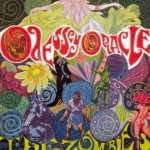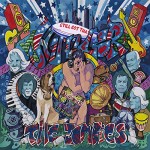There aren’t many people who can truthfully say, “I was a teenage Zombie.” Two of them – Colin Blunstone and Rod Argent – were part of British Sixties band that brought us songs like “She’s Not There”, “Tell Her No”, and “Time of the Season”, and the acclaimed album Odessey and Oracle recorded just before they broke up.
After the break-up, Blunstone launched a solo career that included hit songs “Say You Don’t Mind” and “I Don’t Believe in Miracles”. The Zombies eventually reunited, and have released several new albums, most recently 2015’s Still Got That Hunger.
This was a quick unplanned interview on 9/4/16, conducted backstage before The Zombies performed at the Libbey Bowl in Ojai, California. (Andrew Eccles photo)
Jeff Moehlis: What advice would you give to an aspiring musician?
Colin Blunstone: I met up with Tom Petty the other day, and he said that when people ask him that, and they say “I don’t know if I should go to medical school or go into the music business”, he says, “If you’ve got a choice, don’t go into the music business.” But I’m not going to say that.
Never forget what it was that you set out to do, because sometimes you might have to do other things. You might have to do jingles, you might have to play in bars that you don’t particularly want to play in. But that’s all part of learning your craft, and there’s nothing wrong with doing that on the way to achieving what you want to do. So never forget what it was you wanted to do when you came into the business. But you may have to take the scenic route to get there. That’s the thing. It’s a stamina business. It’s full of peaks and troughs. So that’s the thing – don’t lose sight of what it was you really wanted to do, but don’t be frightened of doing other things.
JM: Did you ever imagine when you started out that you’d be performing 50 years later?
CB: No. When we first started out, I wasn’t convinced that we could be a professional band. We were just schoolboys. And then we won a big rock competition, and that’s when I first thought maybe there’s a way ahead as a professional musician. That was the first time. But in those days, it was kind of accepted that a career in music was two or three years, and then you’re forgotten. So never in a million years would I have thought that we’d be doing this 50 years in.
We got together, Rod and I, for six shows pretty much by chance, really, and it was definitely going to be six shows. And here we are 17 years later. So you never know. You never know what’s going to happen.
JM: One might argue there’s a timelessness to the music. People are still interested in listening to it.

CB: Well, people do say that. Of course you don’t know that at the time. But time is a sure test. It takes time to see if what you’ve achieved has got legs. You can’t know. I mean, when we recorded that [points to my copy of Odessey and Oracle] in ’67, I remember thinking, “I think that’s the best we can do.” And we didn’t get a real commercial success or response, and I think we all felt, “Well, that’s the best we can do. If people don’t like it, perhaps it’s time to move on to other projects.” And that sells more now today than it did when it came out. So who understands? I don’t.
Businessmen are always telling me, “If you do this and this, you’ll be successful.” But they don’t know. They don’t know. So when people tell me that, I say, “Hmmm, hmmm”, and then do what I was going to do anyway.
JM: When I talked to Rod [Argent], it almost sounded like the Odessey and Oracle album was rushed, or at least you only had around three hours per song to record it.
CB: It did come out like that. In Abbey Road they had three hour sessions. So it was 10:00-1:00 – and it was strict – 10:00-1:00, 2:00-5:00, and 7:00-10:00. And in Studio 3 it was right next door to some apartments. The Beatles must’ve recorded in Studio 2, which was a bit more inside the building. They used to record all night. They kind of changed things at Abbey Road. But when we went there it was very much three hour sessions, yeah. I mean, we could come back to a track, but we would expect to finish the track, pretty much. We had a very small budget, so rehearsed extensively before we went into the studios. And then we knew the keys, we knew the arrangement, we were just looking for the performance and just went in and it was comparatively quick. But that’s because we rehearsed, and we rehearsed because we had to, because we didn’t have the budget.

We did it on this last album as well, actually, Still Got That Hunger. We thought, “Let’s do that again. Let’s rehearse”, and we played it practically live. And we all really enjoyed it, actually. But we knew what we were doing when we went in. We weren’t trying to find a way to get a song across. We knew what we were going to do. And you can record quite quickly like that, especially if you’ve got a good producer, which we did have on this last album.
JM: Do you have any other new songs in the works? The new album came out a little over a year ago, and did very well. Maybe there still is a market for Zombies product?
CB: Maybe there is, yeah. I think Rod’s just starting to write again now. I’m trying to write. I’m going to try to do a solo album, if there’s the time, before we do a new Zombies album. If there’s the time. So I’m trying to get things going there. I’ve got a couple of new songs, and a couple of things on the go. So we’ll see. But there will be more product, definitely. Albums take as long as they take.
JM: You talked about recording without spending much time on it. I think The Who was like that. They would just do a couple of takes, when they had the most energy. And I read that sometimes Pete Townshend would teach the song to the band right beforehand.
CB: Certainly it can be true, and there’s an advantage to doing it like that. I mean, Rod’s recorded with The Who. His story about The Who was that he was a session guy, and he would turn up on time. And the only other guy that would turn up on time was Keith Moon. He would turn up on time. The others would all be late.
So after an hour or so Keith Moon would get restless and he’d say to Rod, “C’mon, let’s go out to the pub.” So he was there and he was fine, then he’d go out to the pub and you can imagine what happened. Rod told me that once they went into the pub, and there were a lot of heavy guys there playing pool or snooker or whatever. So as Keith Moon went by a guy was taking a shot, and he went like that [acts out Keith Moon bumping the cue]. Rod thought, “I don’t think I’m going to stay. I’d better get going.” By the time Keith Moon came back, he was plastered. If they’d been there at the beginning…


Discussion
No comments for “Interview: Colin Blunstone”